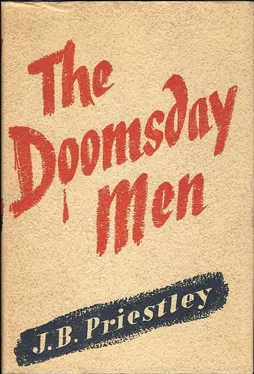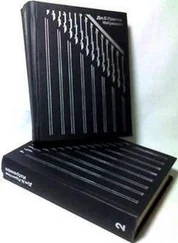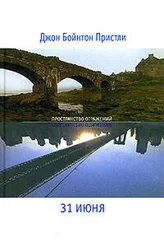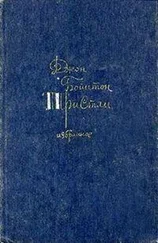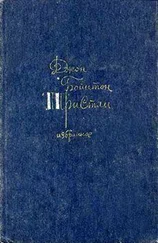For they had both been working in the same remote field, with Engelfield, older by twenty years at least and with far more resources of every kind at his command, some way ahead. Hooker was anxious to get to work again, but first he badly needed some news of what Engelfield was doing. His interest was purely scientific and professional. Remembering Engelfield again now, as he stared at his steamy bedroom window and finished the apple, Hooker decided that he had disliked rather than liked the man, even though he had been such a swell. He called to mind again Engelfield’s thick-set figure, heavy dark face, with its bristling brows and big moustache (he had looked not unlike Stalin), and fiercely arrogant manner, which had kept him changing, to the bewilderment of his colleagues, from one university or technological institute to another. There was nothing of the teacher about Engelfield; he had been the pure research student, looking always for a good laboratory and a university president who would leave him alone with his apparatus and not be always summoning him to clap-trap conferences. That was all right. George Hooker could understand and sympathise with that. But there had always been a bit too much of the lone wolf about Engelfield, who would arrogantly demand information when he badly needed it, but hated to give any; and he had been very contemptuous, very much the sneering senior, that time they had had a sharp clash at the Cleveland Conference. “Our promising young colleague, in his praiseworthy enthusiasm, but rash endeavour to obtain results . . .” that was the line of talk he had handed out, and Hooker still smarted a little at the remembrance of it. But he was not a young man who bore malice, and after all, they were both scientists, weren’t they, both working in the same remote field? “Aw, shucks!” cried Dr. George Glenway Hooker, neatly pitching the remains of the apple into the wastepaper basket, and uncoiling his lean length. Where in hell was Engelfield?
The Cavendish crowd at Cambridge didn’t know where he was. Bergler had replied from Berlin that he was sure Engelfield had not been in Germany recently. Stuvert from Brussels hadn’t heard anything about him. The Radium Institute in Paris had not seen him, for Hooker had gone there himself when he first landed. There was Russia, but Hooker didn’t believe Engelfield had tried Russia: he looked too much like Stalin himself, Engelfield did, to try Russia. So Hooker told himself now that he might as well pack up and get a little real sunshine before settling down to work in the fall. Engelfield, the selfish devil, had meant to walk right out and leave the rest of them guessing, and he had done it only too well. How he had done it, Hooker could not imagine. All that he could imagine, unfortunately, was that just when he was in distant sight of a result, Engelfield would suddenly bob up from nowhere to announce the success of some tremendous experiment of his own.
So George Hooker walked from his hotel down Charing Cross Road and then along Shaftesbury Avenue to Piccadilly Circus, to tell the American Express that he had decided to sail as soon as possible. He did not enjoy the walk; in fact, he did not enjoy London at all; it seemed to him an unnecessarily squat, cheerless, dingy sort of city, with a lot of old buildings in it that were not worth preserving, and a good many new buildings that were only a poor and miniature imitation of New York and Chicago. The museums were good, but the best place in it was the National Gallery, which he had visited several times, for he had an eye for pictures, and there, he had to confess, was a dandy collection. Take the National Gallery out of the city, adding to it the Science and British Museums, and you could have the rest-too damp, too cold, too dark, too gloomy, a mournful Old World monster of a town, terrified now that it would have all hell bombed out of it at the drop of a hat.
The American Express was busy, as usual, and there was the customary chattering swarm of American women with bright orange lips and hard eyes, the sort of women Hooker never noticed at all when he was back home. But there was one he knew, the wife of a chemistry man now at the Rockefeller Institute, and this little woman, who had been quiet and sensible enough at home, now behaved like a mad magpie and screamed all kinds of nonsense at him. London seemed to do something to these women. The thought of royalty and Life Guards and glass coaches and ostrich feathers just round the corner appeared to be too much for them. Usually he was a tolerant young man, so long as he was allowed to work in peace and wear comfortable old clothes, but now he meditated sourly on these phenomena. But after waiting half the morning, he was lucky enough to obtain a berth in the Queen Mary , sailing from Southampton in two days’ time, on Wednesday afternoon.
After a watery and absent-minded sort of lunch at his Bloomsbury hotel, he did a little packing, so that he could send his trunk on in advance, then decided to pay a final call on the Camford Instrument Company, from whom he had bought a few things and whose calm clean showroom seemed to him a haven of peace and good sense. He had still to finish his talk with Morrison there about evacuated tubes. The Cavendish crowd had shown him a thing or two that Morrison ought to have known, for he sometimes did jobs for the Cavendish, and Hooker thought he could cheer himself up and pass the remainder of the afternoon nicely by having a good companionable jeer at Morrison. So, a little after three, he arrived at the entrance to the Camford Instrument Company’s premises, which hid themselves away, like so many concerns in this strange dark island, up a mouldy little side-street, just as if they made burglars’ tools. Just inside the door he waited a moment, to see if Morrison were visible. He was not. But there was a thick-set fellow giving instructions to one of the assistants, and there was something about the cut of this fellow, even from the back, that seemed vaguely familiar to Hooker. So he waited a little longer.
The thick-set man had now finished with the assistant, who brought him a step or two nearer the door. But the thick-set man now waved him away, as if he did not need any further attendance.
“Now don’t forget,” Hooker heard the man say, sharply, “Suite Seven A-the Savoy. Everything else delivered to Barstow, California. Got that? Right.”
Now he was rapidly approaching Hooker, who still stood just in front of the door. The man was wearing spectacles and a short but thick beard; the face was thinner, browner, than the one Hooker remembered; but nevertheless, if this was not Professor Paul Engelfield, late of the University of Chicago and other American institutions of learning, then George Glenway Hooker was no longer quite right in his head. And what luck! At the last minute! Quite excited now, Hooker took a step or two forward, held out his hand, smiled broadly.
“Professor Engelfield,” he cried rapturously, “I’ve been looking everywhere for you. Gosh!-this is great!”
The bearded man stopped dead, stared at him, then said coldly: “There’s some mistake, my dear sir. I don’t know you.”
“But you’re Professor Engelfield, who used to be at Chicago, aren’t you?” said poor Hooker. The light was not good where they had stopped, and he might have made a mistake. But the voice, he could have sworn, was the same.
It had been the same, but now it suddenly changed, was harsher, more guttural, almost a foreign voice: “No. My name’s not Engelfield. Some mistake. Good day to you.” And the man brushed past him and marched straight out.
Hooker remained rooted, staring. Something was wrong. On a sudden impulse he hurried outside, but the man had disappeared, possibly into the taxi that was just pulling out of the street. He returned slowly, trying to puzzle it out, then went across to the assistant, one of those superior dim young Englishmen who never seemed pleased to see a chap.
Читать дальше
